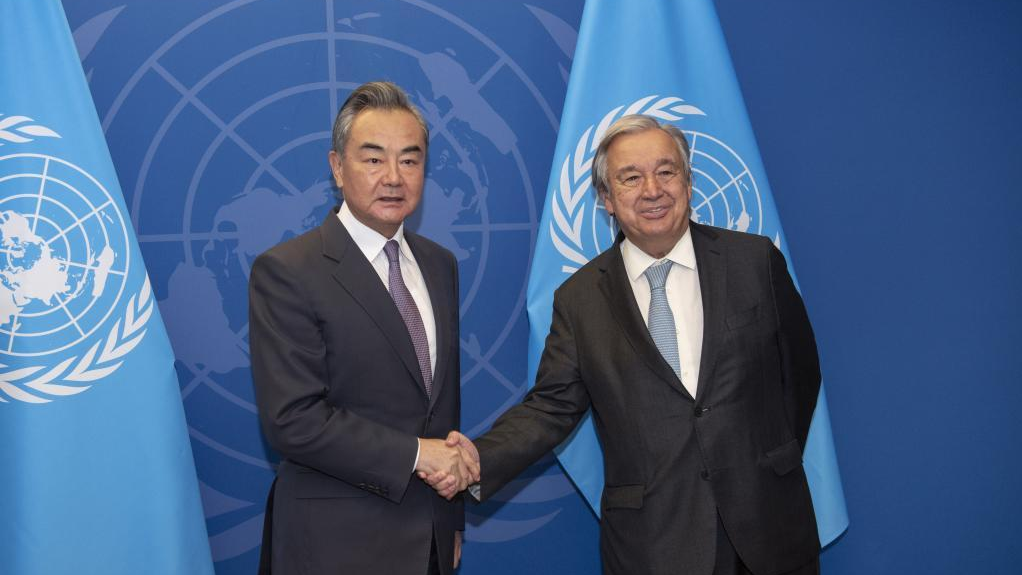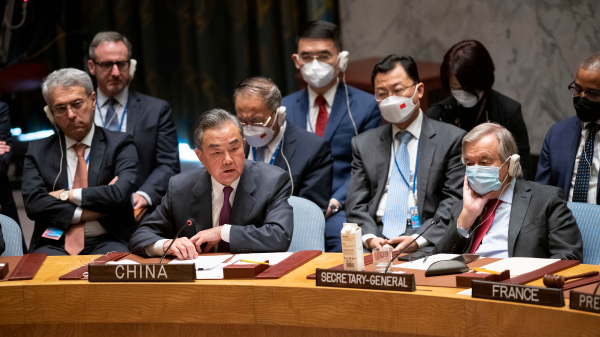
Chinese State Councilor and Foreign Minister Wang Yi (L) meets with UN Secretary-General Antonio Guterres on the sidelines of the ongoing 77th session of the United Nations General Assembly in New York, the U.S., September 23, 2022. /Xinhua
Chinese State Councilor and Foreign Minister Wang Yi (L) meets with UN Secretary-General Antonio Guterres on the sidelines of the ongoing 77th session of the United Nations General Assembly in New York, the U.S., September 23, 2022. /Xinhua
Editor's note: Yuan Sha is an assistant research fellow in the Department of American Studies at the China Institute of International Studies. The article reflects the author's opinions and not necessarily the views of CGTN.
The 77th Session of the United Nations General Assembly (UNGA) kick-started in New York under the theme of "a watershed moment: transformative solutions to interlocking challenges." Chinese State Councilor and Foreign Minister Wang Yi attended the General Debate and laid out China's six-point proposals to the world for the new era of challenges.
China's six-point proposal
Wang Yi opened his speech with a sobering judgement that this is an era full of challenges and hope delineating a new period of turbulence and changes against the historical background of peace and development. He laid out China's six-point proposals as a solution to meet such challenges.
First, choose peace instead of war. He warned that "turbulence and war is like opening a Pandora's box," and proposed that disputes be resolved through peaceful means and conflicts settled through dialogues and consultations.
Second, choose development instead of poverty. He called on placing development at the center of the international agenda and making the fruits of development more equitably shared by every country and person.
Third, choose openness instead of closeness. He admonished against protectionism, which "would only end up falling into the trap of its own making," and appealed to upholding the WTO-centered multilateral trading system and fostering an open world economy.
Fourth, choose cooperation instead of confrontation. He opposed group politics and bloc confrontation, and insisted on dialogue, consultation and win-win cooperation as against conflict, coercion and zero-sum mentality.
Fifth, choose unity instead of division. He rejected drawing ideological blocs by "politicizing, instrumentalize and weaponization democracy and human rights," and called for the shared human values of peace, development, fairness, justice, democracy, and freedom.
Sixth, choose equity instead of bullying. He warned against hegemonic bullying based on the "position of strength," and urged "true multilateralism" to promote "equality of rights, rules, and opportunities for all countries" among countries.

Chinese State Councilor and Foreign Minister Wang Yi (2nd L, front) speaks during the United Nations Security Council Foreign Ministers' Meeting on Ukraine at the UN headquarters in New York, U.S., September 22, 2022. /China's Foreign Ministry
Chinese State Councilor and Foreign Minister Wang Yi (2nd L, front) speaks during the United Nations Security Council Foreign Ministers' Meeting on Ukraine at the UN headquarters in New York, U.S., September 22, 2022. /China's Foreign Ministry
Concrete efforts
Wang Yi's six-point proposal offers an illuminating and practical path for the international community amid a multitude of challenges brought about by a raging COVID-19 pandemic, fragile global economic recovery, and rising geopolitical tensions. He is also using the proposals to dispel the dangerous tendency of ideological divisions, which risks undermining international unity at this time of difficulties.
Some politicians are hijacking the UNGA platform to indulge in political wrangling and forming bloc confrontations, which would do no good to resolve international challenges. Such a pessimistic mood is captured by UN Secretary-General Antonio Guterres as he warned in opening remarks, "Our world is in big trouble. Divides are growing deeper. Inequalities are growing wider. Challenges are spreading farther."
As a responsible nation, the biggest developing country and permanent member of the United Nations Security Council, China must make its stance crystal clear. To this end, State Councilor Wang Yi put forward concrete steps to unify the world and solve problems. He referred to the Global Security Initiative and Global Development Initiative that Chinese President Xi Jinping already proposed.
The Global Security Initiative put forward a vision of "common, comprehensive, cooperative and sustainable security," to address rampant security dilemmas afflicting the world. Guided by this vision, Wang Yi expressed support for all efforts conducive to a peaceful resolution of the Ukraine crisis while opposing arbitrary and unilateral sanctions that would only bring harm to the people.
He also referred to the Global Development Initiative, which puts development first and the people at the center, and seeks to expedite the implementation of the 2030 Agenda for Sustainable Development. He delivered a keynote address at the Ministerial Meeting of the Group of Friends of the Global Development Initiative at the 77th UNGA, where he proposed tangible steps on addressing the food, energy, debt and supply chain crises, which reverberates across the world in order to alleviate extra burdens on developing countries.
China's six-point proposals are clear-cut and practical, which could revitalize the international community to override ideological differences, confront challenges and seize opportunities together at this "watershed moment."
(If you want to contribute and have specific expertise, please contact us at opinions@cgtn.com. Follow @thouse_opinions on Twitter to discover the latest commentaries in the CGTN Opinion Section.)

